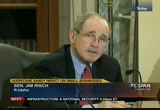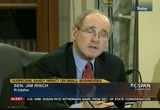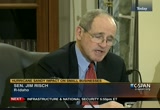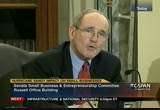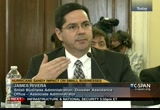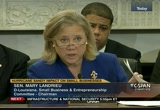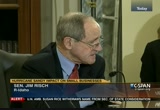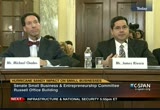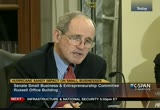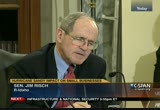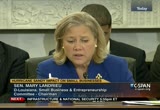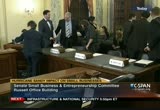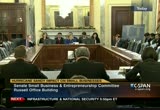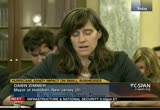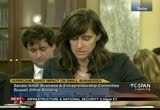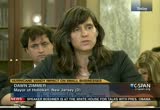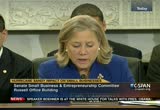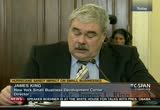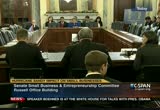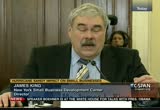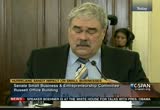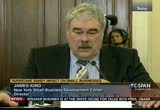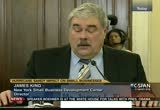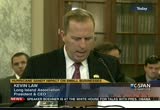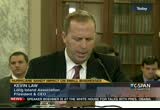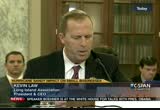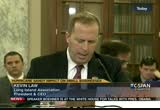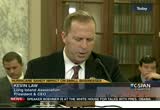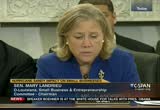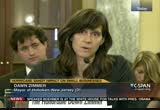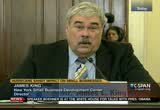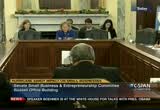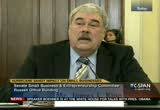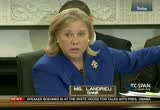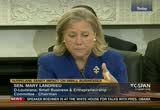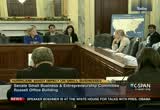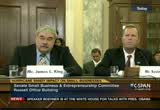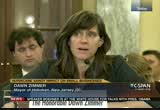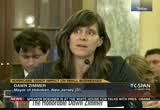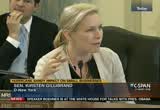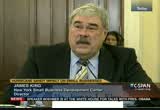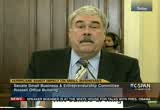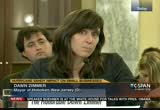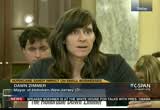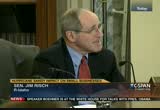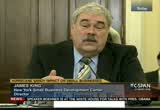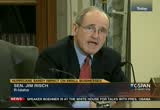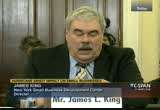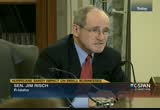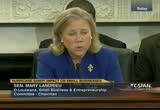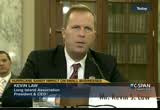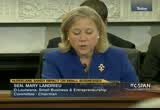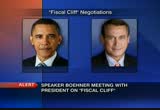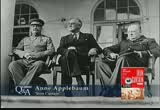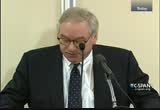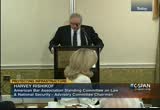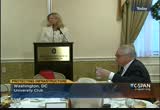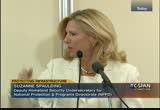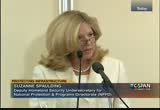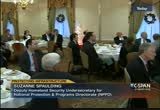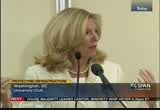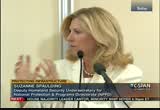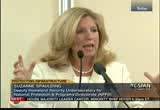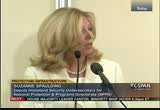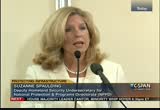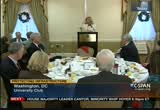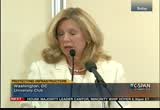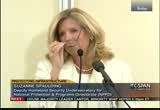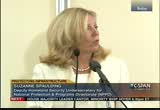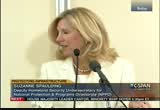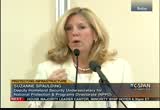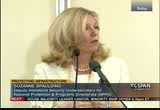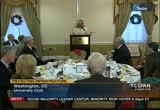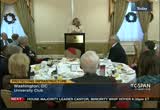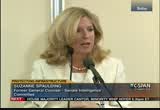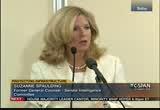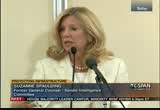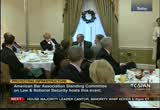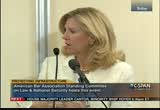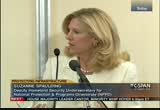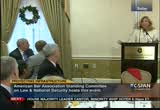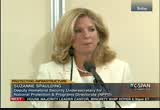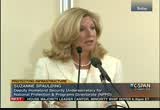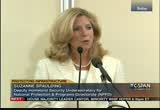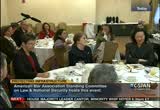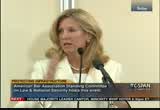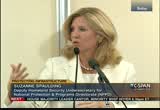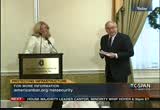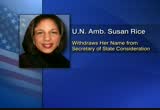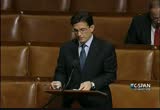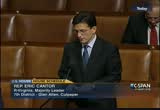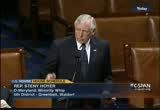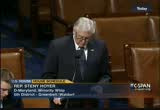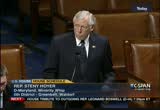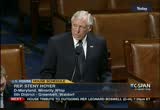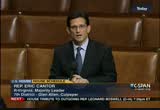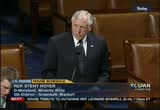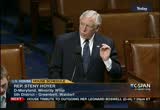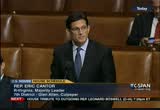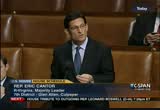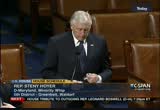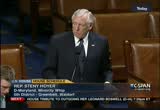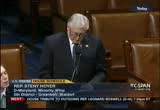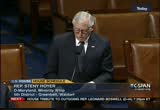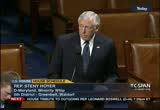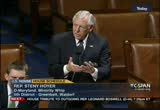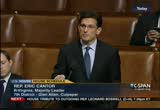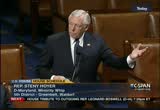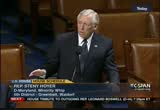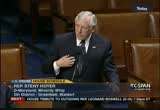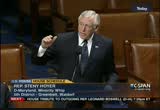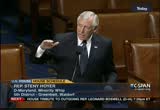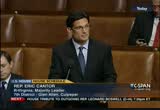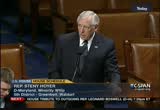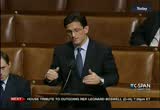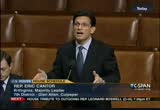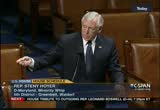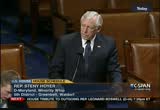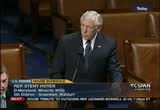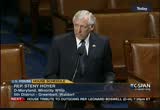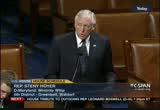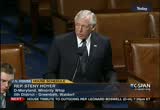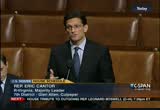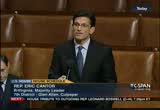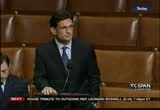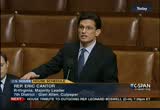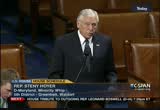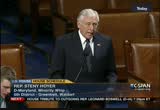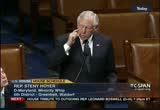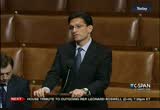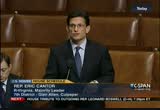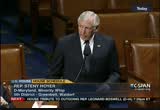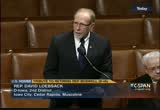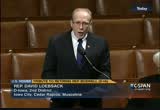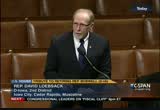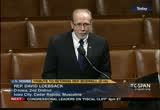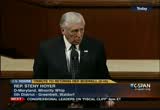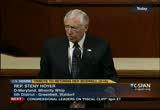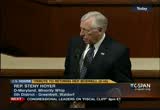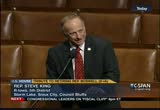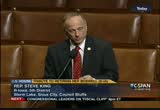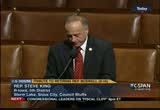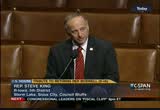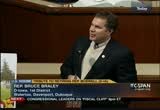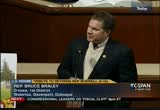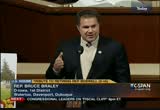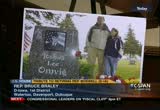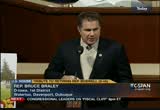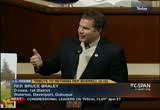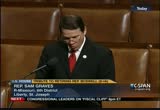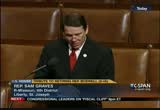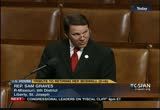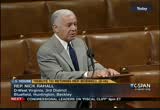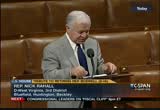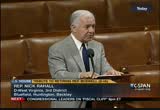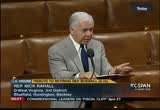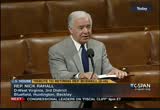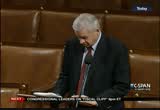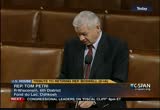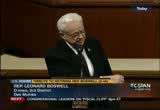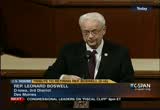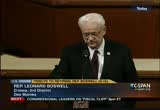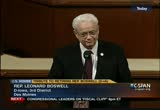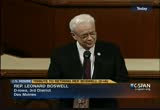tv Public Affairs CSPAN December 13, 2012 5:00pm-8:00pm EST
5:00 pm
>> one would hope so. i understand you want to keep it short, concise, and easy to fill out. but to me, the most important thing after a disaster is the insurance policy. even insurance companies are better than the federal government to responding to claims. it would seem to me that if you look declaims forms for an insurance company, you could probably take a lesson to get yourself quite a bit of information. item 16 says coverage tie. most people are kind of blank and don't deal with that. but if you had them checked a box, such as property, contents, business interruption, they could check the box very quickly and let you know what it was and how much the coverage
5:01 pm
was. it would seem to me to be critical when you were examining one of these claims. i assume that you have a group that works with the claimant as far as dealing with their insurance company. dodge the loan officers deal with the actual agent when they process the application. >> and you feel comfortable with their expertise? insurance companies can be somewhat difficult at times when it comes to claims. >> we have pretty good success dealing with the disaster survivor and the agency. >> i can see i am way over, but i have a number of other questions. in any event, if i were you, i would take a look at the application form. i don't want to see a form that looks like a phone book, but i
5:02 pm
have this idea of keeping it simple. but it seems to me you need more information than what you have. go back to katrina. the chairman indicated there were 18,000 businesses, what percent had insurance? >> i will have to go check the records. i was not with the office of disaster assistance at the time. >> it would seem to me that it is a critical question. can you give me a ballpark? guess, butventure to we can get that information for you. >> i am disappointed in that. did you do anything with katrina as far as making it a learning
5:03 pm
experience? >> absolutely. we have a pretty good prepared this package that goes out and we talk about insurance being key. we do make loans of fraud and we will take it out of the insurance policy. there are lessons learned, but i don't want to state a specific percentage without knowing the facts. >> also on the 189,000 in new jersey, i would be interested in how many of those people have insurance. i am assuming that you would agree with me that it is critical, people looking to the federal government has that been? >> that is part of our process. we will make a loan for $100,000. we will either make a loan
5:04 pm
upfront or reduce the full amount by the 50,000. or will make that loan. >> and will you also take an assignment on proceeds? >> we do when the insurance is settled. >> i think that is enough for this round. >> we can get that information, i think it is very important. it has to be completed and attached to this? in addition to the pages that the senator pointed out we want a simple process. there is one from the insurance, one from the irs, another 22 02 that is scheduled to fix liabilities.
5:05 pm
please let us know. the insurance is required and a very important. it is helping to fill the gap, sometimes those insurance proceeds can be very slow. frankly, some are much better than others honoring the contracts. that is another important oversight that i hope the committee jurisdiction can provide in this recovery. are there any other questions? i would like to move to the second panel. >> we have been hit with a $60 billion request. >> it came from the white house and the appropriations committee. >> what part of that would be
5:06 pm
attributable to this jurisdiction? >> roughly, the request that you make of the $250 million, 40 million for the economic development, 10 million for administrative expenses. >> how much of that will leverage in additional loans? >> approximately $4.5 billion in lending authority. >> i have one other that is not related to that. who put those numbers together? >> which numbers? >> the numbers that you just gave us. >> part of it is the office of
5:07 pm
disaster relief, then there is the bond peace with capital access. >> i assume that we can get in touch with you? when someone applies for a small business administration loan, is the insurance vetted at that time? >> when the loan officer gets the application, that as part of the underwriting due diligence as part of that process. >> anyone with a small business loan will receive compensation from their insurance company? >> that is one of the decisions a small-business owner needs to make. we are just providing one option for their toolbox.
5:08 pm
>> when you do your due diligence, do they satisfy you that they are fully insured? the structure, the inventory? >> we do have exactly what the insurance settlement is at that time. >> i am talking before anything, somebody comes to you. i am looking for someone that comes in for the loan. no disaster on the horizon. >> the loan program and through the banks, that is part of a normal private sector practice. >> go back to katrina if you would. what did you find as far as
5:09 pm
people that have the loan coming back to the sba after a disaster and wanting a loan or something like that? >> an individual that has already received a disaster loan, there is the opportunity we're we require flood insurance because they are in a flood plain and there might be additional damage above whatever the policy covers because of the different footprint for the different type of event that occurs from one disaster to another. >> we can get you information about the program. the default rate is very comparable to the private sector in default rate. it is a modest subsidy for that program. relative to the leverage it provides the small businesses, a lender of last resort. i want to make clear and i think
5:10 pm
the senator has a very good line of questioning that insurance underlies this whole recovery process. these insurance policies can be expensive, but is required. the small business loans are there to fill the gap or to get money more quickly until insurance proceeds come in, but it would be important to submit how many of the businesses that are successful in not just apply in, but receiving loans, what is their level of insurance coverage? let's go to the second panel if we could, thank you very much. thank you will, and if you could stay and listen to the second panel, i would appreciate it. i think it is very important to hear from the mayor's and business leaders on the ground.
5:11 pm
the first female mayor of the new jersey in 2009. the mayor began a career advocate for public parking space and has been a successful mayor dedicated to fiscal responsibility, public-private partnerships and improving the quality of life for local residents. hoboken is one of the more devastated municipalities and regions. i know they can appreciate what you and your city council and citizens have been going through. let me offer you our best in this effort. mr. king has been the state director of the new york small business development center. he oversees 24 regional centers, 35 outbreaks centers. all of your experience must certainly be called bond at tested for the job that is ahead of you.
5:12 pm
the president and ceo of long island association, one of the most respected organizations in new york. he long island economy is made up of businesses, 90% employ 20 people or less. we are interested in what your businesses are saying, how we can be as helpful as possible. businesses,our hearts go out te that you have lost and the devastation. make sure that your buttons are pressed and you're speaking directly into the microphone. >> good morning, committee members. it is a privilege and honor to be here today. hoboken is located just across the river from new york city and is the home of frank sinatra.
5:13 pm
we have hundreds of businesses that call our square-mile city there,. we are one of the most densely populated cities in america, more than new york city. we rank no. 1 in per-capita use of public transportation. we are a vibrant community filled with boutiques, restaurants, and cafes. hurricane sandy was devastating. the hudson river spilled into hoboken from both the north and the south. more than half of the city was flooded. three of the four firehouses and more than 7000 homes were flooded. we estimate the total damage at well over $100 million. thankfully, our main street did not flood and is open for business.
5:14 pm
even the businesses that did not flood have been severely impacted by one of our principal means of transportation to new york. the train has been flooded and still has not been restored. this is due to the difficulty of getting to and from the city. some were forced to operate at an alternate location as they tried to navigate the insurance got lead. the national flood insurance program is not designed to meet the needs of the urban environment. there is a fundamental unfairness that i respectfully ask congress to try to address. there forced to purchase flood insurance by their mortgage companies. the program treat garden style businesses as if they were basements. the direct uninsured costs are
5:15 pm
often passed on to the small business renters. >> the coverage is greatly limited to those with high boilers and hot water tanks. these rules do not reflect the reality of places like hoboken, new york city, and the premise is characterized as a basement that is a critical element to the vibrancy of our state. the apartment that requires you to walk down one or two steps, the business owners and residents are required to buy flood insurance and are required to play -- pay premiums, and they received virtually no coverage. many discover for the first time that their claims are denied because the flood insurance they were required the purchase does not actually insure them. what we have is not a rule that
5:16 pm
protect against moral hazards, but victimizes people in their greatest time of need. the only option is from the small business administration. but many business owners can't afford more debt. we are at risk of losing the small businesses that make our community special. i asked the committee and congress consider other options providing direct relief. those businesses without flood insurance that you seek assistance will be the next a victim's caught in the flood insurance track. if they are able to receive a loan, they will be required to get flood insurance and pay into a program that offers virtually no assistance. the cost will go up excessively, but unless congress takes action, the garden style business or homeowner will be forever caught in a system that
5:17 pm
fails to benefit them in any meaningful way. the inequity of the system is apparent when homeowners are receiving $250,000 in coverage for vacation homes on the shore while primary homes and businesses fall through the cracks. i urge congress to help those caught in the flood insurance track. i hope that you take action to address the unfair abatement issue. rather than denying people coverage, businesses and residents should be given incentives for taking the necessary steps to reduce the impact of flooding. the system of encouraging the energy-efficient flood tanks that will be installed in closets. but it inflicted pain on innocent victims at a time when they are the most vulnerable. thank you for your willingness to listen to our concerns and the opportunity to speak to you
5:18 pm
today. >> thank you for that excellently crafted statement. i have directed the staff to begin working on some of those suggestions. although the flood insurance is not the jurisdiction of this committee, we will look at that request and ferret it over to the appropriate jurisdiction. >> thank you for inviting me to speak. since the storm hit, we have done little else. our previous experience, we were among the first responders in 9/11 for the small business community. a few years later, i was privileged to travel to louisiana when we were confronting hurricane katrina in laying out a strategy for that effort. she has since returned the favor many times over by sharing
5:19 pm
information, materials, and she also chairs the national committee on disaster recovery that is working to institutionalize the best practices about nationally so we can be even better in the future. the magnitude of the destruction can be overwhelming to small businesses as well as responders. it is hard to know where to begin to determine the steps that will be the most productive. it creates a bond where small business people tend to turn because they are familiar with us. the same occurs. on and we reach out to request their assistance soon thereafter.
5:20 pm
the change in the disaster teams, when they came in, they had all the answers. that has changed dramatically. immediately after the hurricane, i received a call from james rivera wanting to coordinate efforts. we would be in proximity to those better the hardest hit. that is because these folks can't afford to travel the distances to get the help they
5:21 pm
should be receiving. we also have the staff going basically mobile. we have given them laptops. communication devices have been donated and we are going into the business of delivering information and the assistance needed. we had 30 volunteers from upstate. we have been deploying those individuals in the areas of highest need since the initial days of the recovery. the loss of power was a critical factor. not so much blaming the utilities but when you don't have power, you don't have communications, the internet, and most are electronic. they just went out the window. 72 local events basically providing information, we had to go back to the old-fashioned way of putting up posters and word
5:22 pm
of mouth to get the attendees in position. many of the documents that the office uses are now on line, and that is a phenomenal improvement from what i can remember. the communication with us made a huge difference in staten island that was extremely hard hit. we put them in touch with the local sponsors, and they located the business recovery centers. the week after the hurricane, they would be five open businesses. we recently held an event out in howard beach, we were able to provide assistance at the event
5:23 pm
for all 45 of them to get started in the process. in new york, we have 600,000 businesses in the disaster area. i consider 100,000 of them to be the primary disaster folks. we are estimating that we can see up to 40,000. we have about 100,000 businesses in the primary disaster area that received the most damage, and we are anticipating over the next several years up to 40,000 of them or so. that is a huge undertaking, especially when you consider the services that they require. i have reviewed the correspondence and i have received over 100 e-mail's since the storm, that includes my entire team. and all the way -- all the way to the administrator.
5:24 pm
i would also like to give a shout out to our delegation. a lot of the events have been co-sponsored -- sponsored by the delegation house. >> i want to thank you for the opportunity to be with you today. we would also like to thank the home state senators, chuck schumer and kristin gillibrand. i'm the president and ceo of the long island association, the legal business organization in the metropolitan region. long island is a long island. it goes from brooklyn to the point, they are politically part of new york city, so the long
5:25 pm
island i am referring to is the southern counties. suburb, arica's first region of 3 million people and the home of the middle class which is built on small businesses. the long island economy is made up of over 100,000 businesses. a 90% of those businesses have 20 employees or less. they're clearly the backbone of the long island economy. the superstores have a devastating impact along island including millions of dollars of damage with a record-setting 945,000 residential commercial customers, more than 90% of the entire grid. 100,000 individual homes, and reaches to the barrier beaches. tens of thousands of small businesses lost power, it
5:26 pm
resulted in small businesses flooded with damaged beyond a simple repair. small businesses that were already struggling in this slow and bumpy economic recovery question if they can survive and remain open for business. we thank the efforts and the hard work of fema and the other federal agencies on the ground since the incident doing everything they can to help us recover. we hosted an event with steve israel and we invited the businesses that were impacted and the horror stories that they shared with us were gut- wrenching. in addition to lives lost and homes lost, to hear the stories of those businesses ruined and destroyed as well, it was gut- wrenching.
5:27 pm
made available to the business communities, those resources to which it legally can, we think some changes are warranted. almost all the federal money available small businesses is in the form of loans. after this storm and in this economy, small business owners are resistant to taking on more debt. most of the money lost by small businesses can never be recovered. a homeowner might be eligible for a grant, but if you are a business owner, you're only federal auction is the loan. this has to change because those do not get back in the business fast by themselves unable to ever open again. small businesses often live week to week and have your reserves and are more dependent on daily cash flow. and i urge you to enhance the
5:28 pm
programs that would include grants to small businesses as well. there are other items. the senator recently proposed new legislation that would aid small businesses in the aftermath of hurricane sandy, and it would provide maximum credits and deductions. an additional federal efforts will also include recognizing that businesses may not have suffered physical damage, but extraordinary losses of revenue due to the power failures in the ability for customers to patronize their establishments. currently, most businesses are ineligible. and the storm recovery fund is approved by congress.
5:29 pm
that way, the state and local governments can respond. we are not only looking to the federal government. as the center mentioned, the local governments are trying to help by providing sales tax relief and property tax exemptions where they can, to businesses impacted. our governor has created a state fund to assist small businesses and has created an empire state relief fund. that gap that is not -- long island has been mayor, we helped put a man on the moon. we have always been there for america.
5:30 pm
we need those resources to get our business is back on their feet. thank you for the opportunity to present to you and to the committee today. i see my great friend, senator gillibrand. >> i appreciate the testimony. i will call on her for her opening remarks, but let me start with you. as you look at the destruction of hoboken and you have homeowners, public facilities, and businesses, transit in the general infrastructure, how are you thinking about organizing the small business recovery?
5:31 pm
what are the tools you are using in terms of organization? what organizations are you looking to help? have you had this discussion with some of the other mayors about best practices to help your small businesses get back up and running. and in the initial thought about what you said this morning to help people at a time of need? >> as i mentioned, the concern is basically businesses as my fellow panelists have testified to, in this economic climate, the rate is a challenge for businesses that are concerned about taking on 4%. we had meetings with small business administration's,
5:32 pm
governors, the business action center was there to try to give businesses as much information as possible, but the bottom line is that what is available is a 4% loan. if there is a way to have grants or a way to possibly have a lower interest alone, we are working with the chamber, we're working with the hudson county. i will say that more information sharing would also halt the businesses as well, but i think that as he lifted these numbers, the numbers that you outlined for new york and new jersey, the economic impact is tremendous when you look at the total impact. this is a situation where we really do need to do as much as we can on the state lovell and on the federal level.
5:33 pm
stepping back and saying, can we give grants directly to business owners? we can make sure that they stay in business. i live in the flood zone, i walked every day to work down first street and business after business is boarded up. it is a major concern what that impact is going to be. certainly, extending the deadline would be helpful, but really looking at the -- >> lowering the rate, having expressed grants -- >> those businesses that are teetering, the grant will make the difference between them staying in business and providing jobs and improving the quality of life are literally going out of business. these next two months are crucial for some many
5:34 pm
businesses. it is a challenge, but i think there are many businesses at that state. the grant program to help make sure that businesses stay in business ultimately will help the economy. otherwise, as all of you know, it is a spiraling impact. >> let me reconcile some numbers. you referred to 100,000 businesses. my records show 265,000 businesses in new york, 189,000 in new jersey not counting connecticut, maryland, some of the other states that were hit as well. what is your number that you put out in your testimony? >> there are the firms that we have looked at from the population information that were in the primary disaster area.
5:35 pm
these are the ones that incurred the worst of the storm. >> how do these jive with the fema numbers? >> the theme and numbers include primary and secondary areas. they had significant disruption of businesses, but not as much physical disaster in our estimation. >> different numbers for new jersey and new york, what would your numbers be for new jersey? and if you would give those for the record, my other question is, if you do your normal business with 24 regional centers and 35 out reach offices, how do you handle a surge? if you are processing the daily
5:36 pm
requirements, they have got to be less than 10% of the pressures that you are feeling now, how are you not surging your capacity to take care of the requests that must be flying out right now? >> what we did immediately was exhaust my annual travel budget by transferring people into the impact area and moving people around. we have pretty much cancelled all vacations, and eliminated anything that has people out of the office for an extended time, making sure we have as many professionals as possible. we are stretched, i will admit it. we're looking to increase the capacity and we hope that the president goes the bill goes through. >> this map represents the
5:37 pm
resource partners in the nation? i wish we have loaded it up for the northeast. would you provitamin with that? how does this reflect your network? these are the women business centers, chapters that could be potentially helpful to the people on the northeast that need to find a regular center that is open. may i please provide the committee with a copy of that as well? in addition, there are a disaster relief centers set up where fema is present, the flood insurance agencies are present. potentially, the red cross. in addition to these centers that are established, there are a disaster centers established
5:38 pm
where people can sometimes get there, walking in, besides doing their business by telephone or the internet. but if this is what your normal operations are, you're going into a very abnormal situation over the next year-and-a-half or two. you have a tremendous responsibility to the hundreds of thousands of small businesses looking to this network for support and help. i want to make sure that we are working off of the same numbers because not to take more time of this committee, but i am interested in how many people walking in the front door, i am not interested in how many forms are filled out. i am interested in how many received actual support from their insurance companies first and any gaps from appropriate and well-crafted and responsible state programs.
5:39 pm
the senator knows that there will be no recovery without small businesses recovering. homeowners also our workers and business owners and if they can't get their businesses back or show up for work at the local bakery, they won't have the money to pay their home loan back home. this is essential and we have got to figure out a better way to bring help more quickly and more supportive. let me get to you for questions or a statement, and thank you for your leadership. turn the microphone on. >> it is essential that we understand how to meet the needs of these business owners. we talk about one of the biggest needs, it is the economy. small businesses are the economic engine for growth.
5:40 pm
if we don't have them up and running soon, we will not have any economic recovery. i do want to recognize our new yorkers. they have been an unbelievable adequate. it represents both large businesses and small businesses. advanced manufacturers, research institutions, and he brought a re of businesses -- i appreciate your dedication, especially in
5:41 pm
this time of great need. we will have enormous burdens placed on your workload. thank you for joining us. we know how tough it is right now, my heart goes out to the families that you represent. for someone that has access to credit, it seems extremely high given the interest rate. i am wondering if we get that percentage done, we get the target that you are looking for. if he were to devise your high ideal business, what would it look like? >> the feedback that we got.
5:42 pm
>> if you are a successful business, you're lowest interest rate is 6%. >> people have said they can get 1.6%, so going as low as possible, getting the same rate that the individuals that would be a great start. you are asking how much grant money we want? right now, the thing i will say is the challenge -- or one thing that would help to make us more effective, it is more data
5:43 pm
sharing. i don't have all the data on the business community. fema has a lot of this information and we have had the whole system where they immediately have everyone signed a waiver so that the information can be shared. there is assistance coming in from corporations, they have been coming in and working with volunteers to break down with the initial mucking out that needs to be done. i think that is one place where we start sharing more information right away and having that system. >> what have you set up for new york? the question about using current
5:44 pm
infrastructure, are you able to leverage the infrastructure available effectively to do this data collection? what do you intend to do to make sure that you are supporting businesses in new york. >> they represent the largest resource opportunity, so we work with the state and the city setting up these micro loans, the rapid response loans running through a quick turnaround. some of the turnaround's have been 48-72 hours. it is a seamless transition from the micro loan initiative to the lending process. it moves the client along and improves the efficiency of it. it is a very small pool of funds
5:45 pm
that is available. i think a total of about 15 million available. that is anticipated to be consumed rather rapidly. i think there was an opportunity to bolster those programs and put some small amounts of money into the hands of business owners so they can enhance the recovery effort, that is critical. i'm talking about the hundred thousand businesses that we are concerned about. we anticipate they are businesses that are either not going to return, or they need to be totally rebuilt. a lot of other businesses, we see damage ha, and with the normal process, they're going to be back. there are some that have been operational long term, the owner is getting more senior and they don't want to put their home up as collateral because that is their retirement. they may not return.
5:46 pm
when they walk away. -- they may walk away. >> like everyone, i extend my condolences, these are difficult circumstances, there are hard to plan for. i was interested. i spent my litigating questions on insurance policies, so i understand it pretty well from both sides of the table. i was interested in your comment about basements and non- basements. is this a federal insurance policy we are talking about? >> de national flood insurance program.
5:47 pm
>> the bureaucracy, i would think, would be -- >> i have been asking about -- >> do businesses have insurance? there are those with flood insurance that won't get that much coverage. then there are those that, they have never flooded before. when they go get coverage for their inventory, they will not get the coverage because they are told that is a flood. they are trying for a loan and
5:48 pm
once they get that, for next year, they will not get that much coverage for the flood insurance. it is a major challenge for the local businesses. >> coverage questions, it is not unusual. the difference on coverage with a basement verses a first floor. you get the electrical panels, and that is about it. >> it can't cover stored inventory? >> no. >> we will certainly have a look at that.
5:49 pm
it is odd, to say the least. >> it is a problem for new jersey specifically, they have a garden state rule that is really odd. we will look into it. >> you were critical of the federal government's response, and i am not going to criticize you for that. when we had issues with them, tell me about your state. >> the state has been looking at just about everything that it can. one of the problems that comes about when we talk about grants, it tends to postpone the action of a lot of small-
5:50 pm
business owners. once you start talking about it, they are much better off if you announce it so that people can put it into their total development scenario. the state came out with a small grant of $10,000 that was being made, in the hands of folks that would have otherwise not pulled the trigger. >> when you are dealing with the u.s. and federal government, you get everything that comes along with that. the paperwork is just awful, if
5:51 pm
you start with the mayor, they can make things happen. as soon as you get to the federal government. this has been going on for a long time. >> i just want to make it perfectly clear, it is a lot better than 9/11. we were working with 12,000 businesses directly impacted by that disaster in new york. today is a cakewalk in all honesty. i can't think of a situation where we did not help every small business at that point of perfection.
5:52 pm
there is going to be a lot of businesses needing help and we are struggling with that. we are trying to come up with the resources. the request for the 60 billion, it does include the ability to extend this effort. it will not be a one-year or two-year situation. they probably won't come back for five years. >> i will conclude with this. i agree that this recovery is not going to take place unless the small businesses recover. congress is not going to help small business in one regard, but small businesses and individuals will keep their tax rates the same.
5:53 pm
it is not a small business, but their taxes are going out next year. pretty much everyone agrees that if it is over 250,000, they will pay more with taxes. the tax rates automatically go up the first of the year. that is an unhappy message to get them, but unfortunately, you have to take it home. it is not going to be helpful for small businesses. >> i will and with asking each of you to say how important is how congress to act or not on the supplemental? and what are people saying about the signals it might send to them? it is a significant number, but in your experience, what you're seeing on the ground, what are
5:54 pm
your people telling you about the importance of that recovery package? >> it is extremely important to the city and the residents. people impacted by the storm, they are located in other areas making that decision. am i going to open back up? it is extremely important, and the sooner the better so that we can get the unmet needs met. get people back to living in their homes, it is so important for the local economy. >> are carries ample local governments are doing their part. the philanthropic community is doing their part.
5:55 pm
unless we have the approval of the proposed package, we are not going to recover. it is critically important that we have that. we have always been there, for everybody else. we need america to now be there for our region as well. >> i would like to agree with my fellow panelists that is truly critical. if we are going to respond as we should and help the businesses and the people that are in the center of the storm, we have to have the resources to do it. we are not living up to our own expectations. >> this committee will come to an end, but the record will remain open for two weeks. i thank the members for showing up.
5:56 pm
meeting adjourned. [captioning performed by national captioning institute] [captions copyright national cable satellite corp. 2012] >> susan rice announced she is withdrawing her name from consideration as possible appointment for a secretary of state. the the president said he accepted her decision. she has proven to be an extraordinary capable, patriotic, and passionate public servant. it comes one week before secretary of state clinton justifies -- testifies. according to news reports,
5:57 pm
president obama and house speaker boehner meeting to talk about the fiscal cliff. there is a stalemate over households that make over $250,000. we will keep you posted on details. the prime-time programming schedule looks like this. we will update the latest on the discussions at 8:00 eastern. then russian president vladimir putin. and a program we will show you from the american bar association, a discussion on threats to the nation's infrastructure. >> my inspiration was that i wanted to explain how utilitarianism happens. we know the story of the cold war. we know the documents, we have seen the archives that describe
5:58 pm
relationships between roosevelt, stalin, truman. we know the main events from our point of view. i wanted to show the different angle, from the ground up. what did it feel like to be subjected to this system? how did people make choices, how did they react, how did they behave? the region that we used to call -- it is no longer -- and they no longer have much in common except the communist occupation. >> more on life in soviet east germany, poland, and hungry from world war two to 1956. saturday night at 8:00 on c- span's q&a. the department of homeland
5:59 pm
security discussed the importance of strengthening in securing america's critical infrastructure against natural and man-made threats. they recognized the aging railroad networks and expressed the need to rebuild and sustain networks. this event is about 35 minutes. >> i have the honor and a pleasure to introduce suzanne spaulding. she is famous for her introductions. we will pale in comparison to . she oversees infrastructure
6:00 pm
protection and risk management and analysis. she will enhance the resilience of critical infrastructure. she had spent nearly 25 years working on national-security issues. she was a principal in the bingham consulting group. s house of rep. she has also spent six years at the central intelligence agency and served as senior counsel and legislative director for u.s. senator arlen specter. suzanne sent us a note. i will read the note. in that no she said, -- notes
6:01 pm
she said, family members may disagree on outcomes, but knowing that we share this commitment promotes reasonable debate. helping to lead to a stronger nation. i am proud to be associated with it. we are pleased to be associated with you. thank you very much for your service to the republic. [applause] >> that was a lovely introduction. i will take you with me anywhere i'm go.
6:02 pm
go. it is a treat. i have been a social with this committee for a long time. this is a wonderful -- we describe it as our family. it is a terrific group. it is a real treat and a honor for me to speak and be up here for more than a couple of minutes. i do want to keep it short because i find what is most interesting is to engage in a dialogue with the experts and intellects that gather for these breakfasts. i want to thank you for being here. most of you came because you know that december is national critical infrastructure protection and resilience month.
6:03 pm
[laughter] in light of that, we are working on that. i would focus on that aspect of our mission. i am now the deputy secretary for the national protection director. that tells you nothing. we are trying to come up with a name that is more descriptive of the work that the men and women who work every day. our mission fundamentally is to lead a whole of nation approach to strengthen the security and resilience of our nation's critical infrastructure against all hazards and an increasingly complex world. that is our mission statement. i will spend the rest of my time unpacking that mission statement. i am not sure it is at the lead
6:04 pm
conjuring up an image of what we do. one of the first things we have to talk about is, what do we mean by critical infrastructure? a lot of you work these issues and have worked with these issues. there are a lot of people when they hear infrastructure think of roads and bridges. it is much more than that. it is all of the goods and services and functions that make up the backbone of our society. i will tell you the statutory definition and what it means. the statutory definition is system and assets so vital to the u.s. that the incapacity or destruction of such would have a debilitating impact on security, national economic security, national public health sasafety or a combination. what i tell americans is that
6:05 pm
what we are talking about is when you get up in the morning and you brush your teeth and you turn the faucet that water comes out and you fall on the switch and the light goes on. you get to work and you can actually take the bus or the subway or the roads. when you get there, you can make a phone call. you can go to your atm and money comes out. it is all of those things. the electric system, watch her system, transportation system, financial services -- water system, and transportation system, financial services, government systems and emergency response. it is those things that make up the backbone of our society. we are looking at these as networks and systems. we have created a priority list
6:06 pm
of the most important critical infrastructure. it has focused on a particular facility. we are challenging ourselves to recognize that we need to view critical infrastructure as a series of networks and systems so that we take into account the cross sector interdependency that will be essential. that is the key turned in our mission. what does it mean to strength in the security and resilience of that infrastructure? security is a term familiar to the folks in this room. we mean it. prevent and protect. prevent bad things from coming at us. by working to stop terrorist overseas, keep them from coming in at the border, access and
6:07 pm
facilities. the protect part, which is the working with chemical facilities, a big part of what we do to make sure they have appropriate controls around their facilities and can prevent adversaries or people who would like to harm us from getting access to sensitive chemicals. that is what has encompassed those traditional notions of security in that term. much trickier for folks to get their arms around is the concept of resilience. we can start with the definition. the department of homeland security definition is the ability to adapt to changing conditions and prepare for, with stan, and recover from disruption. that is a good definition. it is different from placing your critical and for structure in a hermetically sealed to
6:08 pm
where it is protected from anything bad happening. that is not possible. it is not effected. we need to focus on just as much if not more so is making sure happen, youtions have be minimize the disruption that occurs as a result. that is an important part of what we look at. but as go back to talking about looking at these as the networks and systems. it may be that not every node needs to be equally protected or is equally important. some of these things you can lose for some period of time as long as others in that system are up and running. that makes for a much more complex challenge. it will not always be the same nodes up and running or down.
6:09 pm
trying to figure out where you focus your efforts when you try to ensure the robustness and resiliency of a network or system becomes a challenge. it is something we have to do. security and resilience against all hazards. the department was created in the wake of 911. a focus on counter-terrorism. a quick recognition in the wake of katrina that we need to remember that we are here to protect against and build resilience in the face of all hazards. that is physical and cyber. naturally occurring and man- made. one of the things we are putting a lot of attention on these days recognizing the
6:10 pm
urgency of addressing our aging infrastructure and that is a security issue. on november 30, most of you do not know that a train traveling just south of philadelphia coming across a bridge. the bridge shifted and collapsed. four of the rail cars derailed and crashed into a creek below. they were carrying chemicals. including vinyl chloride, a collarless -- colorless, toxins, flammable. it forced the evacuation of 150 homes for over a week. some of those folks have still not been permitted to return to their homes. aging infrastructure does need to be viewed as a security issue across the board.
6:11 pm
in a time of incredibly scarce resources and constrained budgets, this is a huge challenge. we have got to come to grips with this and be creative. we have to think doing smart and financing. the other thing that has gotten a lot of attention is an extreme weather and the threat that it poses. the urgency again of recognizing this will be a long-term process of adopting our critical and for structure and we are faced with an urgent and immediate needs. as we look at new york and new jersey, and we were involved in helping to provide the analysis that policymakers needed
6:12 pm
helping folks think about how to reconcile the urgent need to rebuild, which has to happen quickly with the need to be smart and rebuild not exactly the same. not exactly in the same places but in a way that is sustainable and recognizes that changing world in which we need and the threat posed by extreme weather among other things. we have to bring in creative people in and have a long-term vision. we have to have pragmatic people who say, that is well and good 30 years around the road. how do we decide that lead us in the direction we want to go? smart financing people that can help us figure out how to do
6:13 pm
that. those are a couple of the all hazards we spend time thinking about. we do all of this in partnership. we try to coordinate these efforts and provide input. this is a whole of nation approach. we are working with our partners in the federal government, people at the state allowable and local level, and the private sector. owners and operators who are in the best position to take the steps they need to protect their critical infrastructure and understand their infrastructure better than we can. that is -- those relationships are essential. getting those relationships right is a challenge. many of you know we have been
6:14 pm
talking public-private partnership for decades. we have made great strides. it is an ongoing challenge to determine and work out the appropriate role of government at the federal and state and local level. how do we make sure we are fully leveraging the capabilities, resources, the authorities, expertise of those players coming together and that unity of effort to make sure that we are meeting the challenge i have outlined with regard to protecting the security and resilience of our and for shropshire? richard of our infrastructure. -- of our infrastructure. we cannot eliminate all the risks.
6:15 pm
we are engaged in an exercise of managing the risk. many of you engage in risk management daily. it starts with accepting your risks. the function of the threats to your assets. the vulnerabilities and the consequence is likely to result. that helps to prioritize your risks. you have to find a way to prioritize them. you look at ways to reduce those risks. you come up with the things you can think of to mitigate the consequences, to prevent, to reduce your own ability. look at ways to mitigate that risk. which gives you the greatest by down of that risk?
6:16 pm
you do a cost-benefit analysis. that helps you decide where you will allocate your resources. that is what risk management is about. that is what we do on a daily basis. we try to help pull together the information to perform -- informed decision makers across that spectrum of stakeholders about how to allocate scarce resources to protect that infrastructure to protect american lives. we work hard on the areas where we think the government has an expertise. we have any access to threat information. i am in there fighting to get that declassifies so we can share it widely as is karen wagner to make sure we can share that with our operators and
6:17 pm
state and local folks. we have some insight and ability to look across sectors. to look at cross sector into dependency and the potential for cascading effects. the electric company is focused on maintaining its functions. the electric sector is focused on maintaining its electric grid and the reliability of that. prioritizing restoration means you have to understand what is the impact downstream when the power goes out. who is affected? what are the things that are affected? how do we prioritize those? what is the impact of power lost on the water systems? what is the impact the year of water system of continuity of business? if you have to evacuate buildings.
6:18 pm
what are the cross dependencies with regard to transportation? some are obvious. a lot are not. it goes to analyzing your supply chain, customers, and we work with the private sector folks on trying to understand how these things work together. as an ecosystem are not for. one of the ways is to regional analysis. if you come into a region and analyzed that, and we have done these assessment programs. go into a region and take a holistic approach. analyze the cross dependencies across sectors. where are the weakest links in that complex chain and system of networks?
6:19 pm
we will not be able to do this for every community across the country. every time we do this we learn more that we can share with our partners across our stakeholder spectrum so they can better understand. bit by bit we will build that resilience that we need with in this country. -- within this country. the other area we are focusing on is this integration of -- it is important. you cannot have effected physical security without effective cybersecurity. physical security systems are connected to the internet. we have heard about the ability to hack into surveillance systems.
6:20 pm
they are intertwined. you cannot have good cybersecurity without the physical security. we are familiar with problems of come from potential insider threat and people getting physical access to your i.t. systems. what we are finding increasingly is a cyber attack can have physical effects. an increasing focus on cyber attacks on control systems. the systems that run our kirkwall infrastructures, the operating systems that run those machines and networks and systems are vulnerable to cyber attacks. they are connected to the internet so that the people who maintain them who could be across the country are out of the country can remotely access the system when there is a problem and fix it without having to come into the office. there is a blinking light they
6:21 pm
can go on line and see the problem. our use of wi-fi and bluetooth and all of this makes our control systems vulnerable to a remote attacks. those have physical consequences. as we have tried to get our arms around the cybersecurity issue on the physical side, we have to think about pride toric -- prioritizing critical of infrastructure. you cannot prioritize cyber networks without understanding the physical consequences. consequences are an important part of how you assess risk. and how you do risk-management. we have two structures. one is the office of the pressure protection and the
6:22 pm
other is cybersecurity and communications. one of our challenges has been leveraging those two and bringing them together. our folks in our federal protective service may diet -- guard facilities. they are the security experts for those federal buildings. they can bring that expertise to us. they bring us on the ground truth about the challenges about protecting the building. they are in house critical infrastructure owners and operators. we are leveraging their expertise. we have the folks best known for taking fingerprints of foreign visitors at the airports. they do data management. and biometrics.
6:23 pm
we are leveraging and figuring how to leverage that expertise. we are trying to take a bold approach. a whole of government approach. really a whole of nation approach that involves all of our stakeholders across the board. it is a huge and great mission. i feel honored and pleased to be a part of it. i appreciate the opportunity to talk to you about it this morning. i look forward to your questions. [applause] >> identify who you are. ask your [laughter] noncontroversial question.
6:24 pm
>> what are the rules we are having trouble with in terms of trying to fulfill the interaction? >> there are some and a quick loss we are struggling with in the cyber arena. it will be important to continue to address those. i spend more of my time not in areas that are hampered by legal structures. working on the areas that are hampered by a lack of understanding or an adequate understanding of the world in which we operate. business operates on return on investments. our critical infrastructure owners are patriotic. they are committed to the security and resilience of our critical infrastructure. they have good business reasons for doing that.
6:25 pm
the approach they will take -- you will have better success if you can make the business case. you have to trust businesses' judgment about risk-management. if you are going to challenge that, you have to articulate the delta between their interest in the nation's interests. there may be a role for the government intervention. it is more about finding the ways in which to increase that trust and confidence on both sides of the table and come together with the information. we have a challenge sitting down with critical infrastructure owners to discuss openly their vulnerabilities. that is less of a legal issue getting in the way that it is one of trust and confidence.
6:26 pm
i understand that. i can understand why the private sector is nervous about sharing their vulnerability information. dhs has a good record now for eight or nine years of being able to deal with that information in a way that does not harm the industry and that it will be beneficial to have these candid conversations. we have better luck over the years giving businesses to sit down and engage in a vulnerability assessment. companies have found it by global. -- valuable. it will be a process of building trust. we have made strides. >> talk about the electric grids. how is that going?
6:27 pm
>> we have a project under way in new brunswick cross border with canada. canada has been a tremendous partner with us for critical and for structure. they were anxious to do this. it is a challenge. they have a different approach to critical infrastructure. the government has a different role. we have done our part. we are working with them. they do not do it the way we do it. this has been a learning experience. it has been valuable. we are getting close to wrapping of that project and sitting down what lessons we can learn and how we can do it better. we will do more. canada is anxious to do more. they look at us as having a more experienced -- having more experience in this arena where they can learn from us and vice versa. we are doing cross the borders
6:28 pm
of. >>stuff. >> i am with defense daily. can you talk about smart financing and touched about how that interrelates with sharing of cyber and infrastructure? >> i wish i could talk more about spared financing. i want to get smart finances. there are creative ways of public-private financing. we see that in our transportation sector with private roads and toll r oads. we will increasingly see where folks who have figured out ways to partner with governments that address the private sector's need for return on investments
6:29 pm
in relatively short term and the government's needs for something that is sustainable for the long term and where we have very limited resources. the government has the ability to put into place a legal framework that could assist in that. it has a longer-term framework and the ability to stretch things out. it does not have to satisfy a quarterly shareholder. is there a way to bring that kind of ability to make a longer-term investment to bear with a short-term lack of funds together with the private sector, which may have the resources today but need a shorter return on their investment? i do not know what the answers are. i know some good people who we
6:30 pm
can bring together to help us figure that out. we have begun those discussions. they are interested in moving forward. >> kate martin. it is reassuring to know that you are there in your description of what you do. if you look at it from the outside, one has the impression that the allocation of resources within the government is more likely to follow some kinds of criteria that i would characterize as what is glamorous at the moment. that is what a report
6:31 pm
illustrates. we are chasing these things. this does not make sense. what can you say about how the actual priorities and resources are allocated in terms of having these front-page issues over here about potential terrorists and the fact that a railroad bridge will collapse over a creek in the long term and how many of those are more crucial? >> this is part of the risk management exercise. make sure we are allocating our resources in the areas of greatest risk. the department is beginning a quadrennial review. part of that exercise is to look across the board at the
6:32 pm
spectrum of risks from terrorism to bridge collapse and everything in between. make an effort. it is an inexact science. prioritize those risks. understand the things that now we should be making our real investments in. it is not just a function of risk assessment. it is a question of where you can buy down that risk. you are seeing the importance of addressing our aging infrastructure, of coming up with ways to deal with extreme weather. i do not know if you saw the new york times article that had illustrations of what smart people are thinking about ways to protect southern manhattan from storm surges and extreme
6:33 pm
weather in the future from oyster beds to big walls. lots of good thinking going on out there about these issues that are increasingly important and that are not going away. they are becoming urgent. government is capable. it is a huge ship. it changes course and a slow way. we are seeing some of that. >> we are happy you are with the administration. we sleep better knowing you are not sleeping so well. we would like to give you our newest book. your brother is here.
6:34 pm
read the book. gather around the christmas tree with us. thank you for coming. go love. we hope to see you soon. [applause] that concludes our breakfast. c-s[captioning performed by national captioning institute] [captions copyright national cable satellite corp. 2012] >> president obama and speaker boehner have ended their meeting. lawmakers have until december 31 to avoid going of the fiscal cliff. no words on what came of the negotiations. earlier, the president accepted the word from susan rice that she will not be seeking the
6:35 pm
nomination as secretary of state. she said she request that you do not consider my candidacy. the president accepted the decision. susan rice will meet with the president in person tomorrow. earlier, the house finished the week on capitol hill passing bills before leaving for the weekend. one at curbing improper payments by the federal government and eliminating automatic audits. members agreed to a plan promoting security for afghan women and cross as part of the 2013 authorization bill. members return monday at noon. house majority leader eric eric cantor and minority whip steny hoyer discussed next week schedule. this is about 45 minutes. >> mr. speaker, the house will
6:36 pm
need at noon and 2:00 p.m. for legislative business. the hassle me at 10:00 a.m. for morning i were in noon for legislative business. friday, they will meet for legislative business. the weekend session is possible. last votes for the week are not known. the house will consider bills on the suspension of the roles. a list will be announced by friday. we expect a conference report for the fiscal year 2013 and of the expiring provisions of what are possible. the house will not adjourn until action has been taken to avert the fiscal cliff. members are advised to return --
6:37 pm
retain flexibility through the end of the year to the maximum extent. i yield back. >> we had thought that we would not be meeting on monday. we will be meeting on monday and coming in at 6:30. take note of that. can i ask you if you know we may be considering on tuesday? a number of members with schedule things to say during the day and have asked me that question. my presumption is the defense bill conference will not be done by that time. i do not know if that is your
6:38 pm
sense. >> i would say that he is correct in assuming that the defense bill will not be ready. we do not know for sure. probably by wednesday or after. without complete shorty, the gentleman likely a suspension debate on the floor on tuesday. >> members will find that helpful. the majority leader mentioned last week that we will not adjourn till we have averted the fiscal cliff. the american people will share that view and would hope that is the case. on the fiscal cliff, one of the things of concern we had a debate upon the floor today,
6:39 pm
part of the negotiations are with respect to the 98% of americans who fall into a category we seem to have agreement on should not receive a tax increase. there have been an increasing number of republicans and democrats who have urged us to take that issue on which we agree in the near term. i ask my colleague whether there is any possibility that next week we may consider that segment. let me make a rental of a suggestion to the majority leader. we have a disagreement on that over 250.
6:40 pm
we could consider two bills. one for those under 250 or 200. another which would involve extending the tax cuts on those over those limits. members could express themselves on both of those propositions. the gentleman has pointed out repeatedly small businesses would be hurt if we did not extend over the 250 level. that would give members the opportunity to express .hemselves as wel that would give the senate - both of the bills would pass. that would give the senate two bills to send to the president
6:41 pm
to the extent we could reach an agreement and have certainty brought to some segments of the population. >> he is correct. we have discussed this before. that suggestion has been brought to me on several occasions this week. he joins me in the desire to try to address the aspects facing this country in terms of the fiscal cliff. try to put us on a path to manage down the deficit and debt. we are trying in terms of negotiating with the white house and the speaker has been earnest in his desire to want to address the spending problem and the gentleman's suggestion when that goes to that. his proposal would lead the
6:42 pm
issue of increased taxes on small businesses making over $200,000 per year and if the concern is to try and focus on generating more jobs and helped fuel the economy, i have asked the gentleman, what is his suggestion about helping those businesses? the preponderance of the jobs created come from those small hundred thousand dollars and up. >> we have this discussion on a regular basis. when the gentleman talks about small businesses, he is talking about 3% of the small businesses in america. 97% of small businesses make less and would be positively
6:43 pm
affected by the bill that affects those under 200,000 individually and 250,000 collectively. 100% of the small businesses would be a short. let us say they make 350. they would be assured that the first 250,000 would not give a tax increase. i am concerned about the small businesses. they will be included in the under 250,000 and another 200,000. 100% of america would have the assurance that the first 250,000 or 200,000 would not get any tax increase. the gentleman in the election cycle of 2010 talked a lot about bringing confidence and certainty of what the tax
6:44 pm
structure and what the rules would be. i suggest to the gentleman -- the other 3% would be knowinaffd that there would be not a tax increase. d below those figures. and i yield to my friend. mr. cantor: i thank the gentleman again. i said to the gentleman before, the majority of business income comes from those small businesses with income over $200,000. and the higher the percentage of income derived if the small business the more jobs are created by that individual. and that is the point. we also know, and the gentleman
6:45 pm
has heard me recite these figures before, there was a third party outside study conducted which would indicate that if we gentleman's proposal has passed, we are going to see the reduction of 700,000 jobs going forward. again if the fus son jobs, as it suld be, it raises certain concerns. i would also remind the gentleman, he and i both feel very strongly about trying to do something about the fiscal health of the federal government in attempts to try to heal the economy and the fiscal helt of the government has much more to do about getting control of the spending rather than bring manager revenue in. more revenue in can come if we grow the economy but just by statically increasing tax rates without doing anything to try to address the spending problem, will actually make the problem worse and will leave that mountain of debt untouched and as the gentleman knows, our
6:46 pm
speaker has tried and tried t get the white house engaged in actually discussing specifics the way those specifics were discussed a year and a half ago. and these kinds of things that we all know need to be done on the entitlement program, the white house needs to come forward and say they'll join us in trying to fix the problem that is what we have not seen. we have seen, mr. speaker, you know, speaker boehner, go forward and put revenues on the table, instead, we asked the white house to join us in trying to fix the problem of spending and that's where things have stopped. and hopefully we can resolve that and as the gentleman knows, i'm committed and as we have announced in the schedule, to stayingere until we can resolve the problem. i yield back. mr. hoyer: i thank the gentleman for his comments. i agree with him, as he knows, staying here until we get this
6:47 pm
oblem solved. america expects it. america more importantly needs it. and the economy needs toe the confidence of a resolution of this stalemate. so i agree 100% with the gentleman but let me say in terms of the -- in terms of again one of the disquieting factors is that we can't even act on that on which we agree. now the gentleman and i disagree on a proposition, that is the gentleman believes and cites a study this we think is questionable -- of questionable validity that says we're going to lose jobs if we raise taxes on those above $250,000. we don't share tha view, most economists i've talked to don't share that view there is a study the gentleman refers to that says that, i understand that. what i'm saying is, we can vote on that, and some of us will
6:48 pm
agree, some of us will digree. but if we can't vote oint, let me call the attention to somebody who is certainly not a democratic spine meister -- spin meister but i think the perception will be that what we are doing is holding the better off, we can't help them, we can't help those who are not making as much money. david brooks i'm sure you're aware of david brooks' column in the "new york times," not a liberal democrat, not a democrat, i don't think he's a democrat or a republican, but more conservative columnist, says this and i quote fm "the new york times" just a few days ago, sometimes you have to walk through the desert to get to the promised land. this is a quote. a budget stalemate will confirm every bad republican stereotype. republicans will be raising middle class taxes in order to serve the rich.
6:49 pm
hurting sam's club to benefit the country club. if they do this, they might as well get mitt romney's 47% comment printed on t-shirts and wear them the rest of their life. i say this not to criticize but to say that ther is peppings is if we do not act on something on which we agree, we are not doing so because we wancht to make sure that the best off -- we want to make sure that the best off if they're not helped, nobody will be helped. i think that's not good for the country. i think frany it's not good for the congress. not necessarily republicans or democrats. i think we're all perceived as having the ability to act or not act. if we're going to get this fiscal cliff resolved, it will be because we agree on that on which we can agree. here we d. -- we do. we he 167 c.e.o.'s who have written to us saying that the business round table agrees we oughto move in this direction. bob corker, senator corker,
6:50 pm
said that the other day. others have said that as well. and i really don't think it's a -- either a political gotcha or political advantage. i think it will do what the gentleman talked about, it will give confidence to 98% of the american people who pay taxes that they don't have to worry on january 1 about their taxes going up. it seems to me that's a positive for our economy. because it will give them confidence that they're going to have resources to do some of the things that will help our economy grow. i understand the gentleman's position is that there'll be 2% who won't be -- have that confidence and 3% of small businesses, as the gentleman points out, those 3% are latively large businesses in the sense that that 3% gets 53% of the business income. he's correct. those are large small businesses. or in many cases, individuals who just make a lot of money. that's fine.
6:51 pm
but they're not the majority, i think job creators, in terms of numbers of small businesses, who have added one or two or three people to their rolls. we can get off this but i certainly will yield to the gentleman and hope that we can do this, the reason you've got then suggestion of a two-bill strategy, two-bill scenario, because that gives everybody in the house of representatives and you talked about this and particularly in 2010 but have talked about it since then of giving the house of representatives the opportunity to work its will. two bills, you move them forward, one which the president says he will sign, up with which the president says he will veto and after all he'll be our president for the next 50 months. we can get something done. and at the same time all 435 members of -- members, or 433 i think we have at the present time, can express their views
6:52 pm
on those issues on which we have agreement and those issues on which we have disagreement. i yield to my friend. mr. cantor: on issues -- on issues we have agreement on, i think we have agreement on many spending issues. i think the gentman has been outspoken in his commitment to say, hey, we've got to modernize if you will, the age eligibility of some of our entitlement programs. i thank the -- i think the gentleman if i'm correct, has said he's in support of adjusting the age eligibility for medicare. mr. hoyer: what i have said is, and i've said everything needs to be on the table. not that i agreed with everything that would be on the table. i have some very substantial reservations about age increase, particularly in the ryan bill, it doesn't get you any money in the next 10 queers, it won't help us get to that fiscal crisis. what i have said and i peat is you have the right to put everything on the table, twheff right to put everything on the table. if you're going to have an
6:53 pm
honest negotiation, we ought to consider everybody's point of view. that's what i said. mr. cantor: and i say to the gentleman, this is the kind of conversation we should be having about fixing the problems rather than just kicking the can. and again the gentleman has been very upfront about i think his commitment to do some of those more difficult political things that i agree with him on. unfortunately, we're not having those conversations. and we're not having those conversations because i believe there are others in his party in the house and elsewhere, certainly in the white house that refuse to engage the specifics about how we address the mountain of debt and the continuing spiraling upwards of spending. and that is what we've got to do. i think the gentleman would say, without -- running the risk of putting words in his mouth, that many folks out there w are wealthy would say sure i'll pay more taxes. but i go back to those individuals, i believe you say
6:54 pm
that because you trust that your money is being ent to pay down the debt an deficit. that's what we're trying to get to. none of us on this side of the aisle believe raising taxes is good in this economy or something that we should do, feeding more money into the federal government and certainly as the federal government is not fixing the problem. th's what we're trying to do, mr. speaker. i know the gentleman understands my point of view on this and we've had this discussion continuously. i yield back. mrhoyer: i thank the gentleman for his comments. it is a discussion the country is having. it's a discussion we need to have. and we need to have it honestly with one another. and the gentleman knows my position, it's not taxes or spending, it's, if you buy something, pay for it. we haven't done that. that's what creates debt. taxing doesn't create bt, spending doesn't create debt if you pay for it. spend creag ates debt only if you don't pay for it. the revenues, taxes, are what you pay for things you buy.
6:55 pm
we are buying things and we're not paying for them. and your children and mine are being put in debt as a result. so this debate is really about what are we going to pay for? how much do we want to do? and if we want to do it, we need to pay for it. the ntleman know misside very much believes that we had two tax cuts in 2001 and 2003 and didn't pay for them. we had two wars, pote of which i supported as the gentleman knows. we didn't pay for them. we passed a prescription drug bill and didn't pay for it. hopefully we're going to pass a disaster relief bill that hopefully we're not going to pay for in the short-term but that we will pay for and have a scenario to pay for in the longer term because we owe that to our children. mr. cantor: will the gentleman yield. mr. hoyer: just to make the point, the gtleman talks about tax and spending is the problem. the problem is we vote to buy things. whatever those things are, and
6:56 pm
we isn't voted to pay for them -- we haven't voted to pay for them. the discipline in any system in the family's budget, in the country's budget, should be, if you want to buy it, have the discipline to pay for it. or at least to amortize it and pay for it over a series of careers -- years that you plan for, we havet done that we're in a debate about this fiscal cliff about how to do that. we pn this fiscal cliff. this is not happenstance. we planned, i didn't vote for the tax bills but they sunsetted. they sunsetted this december 31. that was planned. it was planned because of a scoring issue. not because i think your side really believed they ought to sunset but because of a scoring issue. the fact of the matter is the sequester was put in place as a fail safe to make the supercommittee work and it didn't work so on january 2, the sequester takes place. i don't think any of us
6:57 pm
believes the sequester ought to take place in the way it's planned to do so. what i'm saying to t gentleman, everything that happened on december 31 we planned, we put in place, we sunsetted. yes, taxes is the way we pay for things we buy, because if we pay for things we don't -- i'd be glad to yield. mr. cantor: mr. speaker, along those lines, the gentleman tas about the 2001-2003 tax cuts. he's talking about mostly the 98% that he refers to that continue to need that tax cut and i'd ask the gentleman if he's now saying if we need to pay for that tax cut? mr. hoyer: i absutely believe we need to pay for that tax cut over that 10-year plan that we came up with to get us to a place that we can agree on being the objective in 2022 or 2023 as to where we want to be as a country in terms of fiscal sustainability. a credible plan that will get us from here to there,
6:58 pm
including taking cognizance of the costs of those tax cuts. yes, i'm saying over the longer term we ought to pay for it. right now the economy is struggling. the reason none of us wants to raise taxes on the average working men and women of this country is because the economy is still struggling. we are going to have that issue in terms of the payroll tax cut. we did the payroll tax deduction which is controversial and hasn't been a lot of the discussion in order to get some additional revenues to present cut in the fica tax -- 2% cut in the fica tax, actually a third of the cut so we can get additional moneys in the pockets of consumers so they can continue to buy. the economy has been better than it certainly was. we have grown but not to the extend we need to, and that is why our view is that for those working americans we ought to continue that level. but not because we think that we ought to just put that on
6:59 pm
the credit card and forget about it. it's got to be part of this fiscal cliff negotiations and your point is making sure we pay for things. mr. cantor: mr. speaker, i know the gentleman's view is -- my -- that's exactly the point of these discussions. where is the discussion about e specifics on where we are paying for things in terms of reducing spending? that's exactly the point. if the gentleman will be so kind as to go to the white house and engage the president and say, hey, give us some specifics, because the president so desperately wants to raise those taxes and to grant the 98% the tax relief. and if the gentleman's contention is the president's, where are the specifics on the other side of the ledger? that's exaly what we're saying, mr. speaker. we need to solve this problem.
7:00 pm
mr. hoyer: we had that -- in fact -- reclaiming my time. we had that discussion in terms of specifics. i pointed out to the gentleman last week and i'll point out to him again today, the president has in his budget 23 pages of cuts, including very frankly with respect to medicare in which he cuts more, specifically identified, than paul ryan's budget tha passed this house reduced medicare expenditures. so i will say to my friend, given this list he can't see, you have five items in the letter you sent. five line items. all conclusionary. no specifics. for instance, the gentleman referso $800 billion. not the gentleman, but in the offer -- the republican offer refers to $800 billion in revenues. now, the president's been very specific as to what he thinks we ought to do in revenues.
7:01 pm
we ought to go to the clinton rates on those over $200,000 individually and over $250,000 family. very specific. and he's made other specific proposals that would get him to his revenue number. frankly, your revenue number is positive on the fact we are going to reduce, as i understand it, preference items to attain an additional $800 billion in revenue without including -- without increasing rates. i understand that general proposition. would the gentleman then tell me which preference items you would reduce to get to the $800? that's a little rhetorical. i don't think it's to the extent you have been specific in terms of your offer at all while i do believe the president has put forward both on the tax side and the spending side some very specific proposals on how to get to his numbers, and i yield to my friend. mr. cantor: i thank the gentleman, mr. speaker.
7:02 pm
i will say this. again, the gentleman has been very good, not in negotiations with the speaker and the president, but knowing the state of affairs. because this is the problem. if the gentleman said that we ought to look to the president's budget proposals as our guide what he would submit and propose as to specifics, just yesterday i think the news came that the administration has now decided not to uphold its commitment on the medicaid reduction in spending. and so what are we to believe as far as the president's proposal in his budget from months and months ago and how that applies to the discussions and negotiations around the fiscal cliff, which is exactly why we need the specifics now. i understand and take the gentleman's point as far as $800 billion. but we have not dealt at all with the spending side of the ledger, and the commitment should be balanced. as the president always said,
7:03 pm
we need a balanced approach. but yet we don't have any discussion on the spending side of the ledger other than to reference a prr proposal by the administration which the administration now has said, no, we're not sticking to that on the medicaid piece. so what are we to believe? which exactly the point we need real specificity in terms of the spending, and i take the gentleman's point on the $800 billion. yes, but it takes two sides, and this white house and president have refused on the spending side. and i yield back. mr. hoyer: well, of course, again, we have a disagreement. this list -- i can't read it either. mr. cantorwe have just seen the administration backtrack its commitment on this list. mr. hoyer: i don't think he backtracked. what he said was and what we have said continually is on the revenue side, if you're going to have a balanced package, on the revenue side, this is his
7:04 pm
specific proposal. he's me a number of proposals on the spending cut side already. as i said in medicare more than the ryan budget in his budget. the fact is -- i will tell the gentleman -- you have no specificity on balance nor do you have any specificity, frankly, on cuts. there's no specificity on your spending cuts here. there are' conclusions. so -- they're conclusions. so i don't know how you think one side can be specific and the other side comes with five lines of dollars that add up to $2.2 trillion, none of which have any spessfiss -- as you see there's no individual items below those five lines saying where you want to cut or raise revenues. therefore, i think it's -- we need to get to an agreement. this argument is not vy helpful i think. we need to get to an agreement.
7:05 pm
both sides need to get to an agreement. but the reason we get into this conversation is we have agreement on a part of that which will help give confidence to our people. and that is on the middle-class taxes not going up. i would again urge and perhaps we can get off this subject because i don't think we're really enlightening our public very much other than the fact there are obviously disagreements but they expect us and we need to bridge these disagreements. i think the president has shown -- you and i participated in discussions with the president of the united states, and i've been here 31 years. no president in the 31 years i've been here have spent as much time sitting in the oval office discussing with you and i and others, mr. boehner, ms. pelosi, mr. reid, mr. mcconne and others, sitting in the office trying to get to specific agreements. this president's willing to do
7:06 pm
that. and he has done it he'shown that he's willing to do it in 2011 and you and i were in the roomatching it happen. now, did it result in what we wanted and that was an agreement? it did not. that was unfortunate. but this president's willing to do it. hopefully both sides are willing to do both sides of the ledgerwhich the gentleman points out, revenues and spending, balanced package, getting us to where we need to be. i'll move on to another subject unless the gentleman wants to make another point. ok. debt ceiling. i'm very worried about the debt ceiling, mr. leader. i think the debt ceiling is something that you and i have expressed both publicly and privately ought not to be something that really we put at risk. i frankly think all the leaders that i've talked to on the republican side and on the democratic side think that when you incur debts as the united
7:07 pm
states of america, the most credit worthy nation on the face of the earth, that you have every intention of paying those debts. the debt ceiling theoretically says you can't pay over a certain number. you can't go into debt any more. you and i both know that sometime in february, maybe later, that debt ceiling will be reached. very frankly, both parties played a game on the debt ceiling. when you were in charge, we played the fact that the debt was your problem because you cut taxes and didn't pay for that. on your the speaker pro tempore: you said we spent too much money and we didn't pay for -- on your side you said we spent moneand we didn't pay for it. neither one of ourselves covered ourselves with a great deal of glory o that. the debt ceiling has to b raised because america will pay its bills. america will be credit worthy,
7:08 pm
and we saw the last time we h this political -- i call it a charade or dance -- the last time for the first time in history, first time since you and i served here -- history is a lot longer than that -- the credit of the united states of america was downgraded by one of the rating agencies, standard & poor's. i would hope that the debt ceiling would not be a subject of disagreement. the president has proposed senator mcconnell's proposal so that the party in charge could take charge. the president of the united states would say, look, in order to pay our bills we have to raise our debt ceiling. most countries don't have a debt ceiling, of course. most families don't have a debt ceiling. they incur debt, they expect to pay it. i would hope that this would not be a subject of political leveraging or political disagreement. we know as an economic fact of life that we're going to have
7:09 pm
to increase the debt limit. and i would ask the gentleman if he has any thoughts on that and when we might act on that. i yield to my friend. mr. cantor: i thank -- mr. hoyer: i d't think i finished for anybody who happens to be watching us is not bored stiff at this point in time. the mcconnell proposal was that the president would propose a level and then if thatere not rejected by 2/3 of each house it then would go into effect which means that the president of the united states, republan or democrat, would take the responsibility for making that judgment on behalf of managing the finances of our country. and i yield to my friend. mr. cantor: mr. speaker, i thank the gentleman for yielding, and i believe that in all fairness looking at the credit rating agenciesnd their view towards debt ceiling increased discussions, some of that certainly has to do with the continuing increasing of debt and its burden on this
7:10 pm
country, our citizens and its economy. if the gentleman recalls a year and a half ago when we were engaged in the discussions around the increase of the debt ceiling, westablished a proposition which said that if we're going to increase the debt ceiling we ought to be decreasing the spending in a commensurate amount. very simply put. the difficulty was we could not get the gentleman's party and/or the white house to go along with us in terms of agreement of those spending reductions. in echo of the original discussions the gentleman and i just hads far as the fiscal cliff is concerned. our commitment is to try to rece the mountain of tet that is strangling this country and trying to stop the spending that continueso spiral out of control. so any discussion of the
7:11 pm
increase of debt for us has to be accompanied with a real commitment to the reduction in spending, otherwise, those credit rating agencies are going to continue to do what they did. and so in order to engender confidence in those agencies and the market and throughout the american economy and the public, we have got to gain some credibility on the spending issue and stop the spending. that is our position, the gentleman knows at. yes, we all agree america is a country that pays its bills we need to stop racking up so many of them. we've got ton a situation where we are generating trillions, $1 trillion of additional annual debt. we can't do that. and that's why we take the position we do. to try and arrest that, to get our ecomy back on an even keel so we can heal that
7:12 pm
economy. i yield back. mr. hoyer: i thank the gentleman, i don't think he answered my question about the debt limit, therefore my presumption is that unfortunately it will continue to be an item used as leverage, holding hostage the credit worthiness of the united states. mr. cantor: at's a mischaracterization of my remarks. all i said was, we feel that this white house has a tin ear in terms of the spending problem. what we're saying is we need some balance. just as the rhetoric comes from the white house, that we need a banced approach, we need a balanced approach on both sides. spending and revenue. that's what the whole discussion is about on the debt ceiling issue. because it is accessing additional funds for the federal government instead of through taxation, but borrowing. but equally if we're gong to increase that, we better be decreasing the other side of
7:13 pm
the ledge sore we don't continue to increase and mount that debt. mr. hoyer: i hear the gentleman and the gentleman says spending is the problem. if spending is the problem and spending obviously is one of the challenges we confront as is revenues, if that is the case, then let me remind the gentleman that during the time that his porte was totally in charge of spending, spending increased very substantially. otherwise known as 86% increase from 2001 to 2008 in the national debt. 86%. increase. now under ronald reagan it incrsed 189%. under this president it's increased 41%. and he confronted the deepest recession as a result of the economic picies in part pursued in the last administration which i did not
7:14 pm
support and which my party did not support. so if we want to get into this i hear this about spending all the time. we had a pay as you go, bipartisan process in place, put in place by george bush the first and democrats in 1990. in 1993, that pay as you go was continued. in 1997, a deal between mr. gingrich and mr. clinton continued that pay as you go process an for four years in a row, the last fo year of the clinton administration, we didn't borrow a single additional nickel to raise the debt limit. we didn'tave to. why? because we were paying for what we bought. now republicans were in charge of the house and the senate for part of that time. and so they deserve some of the responsibility for that. and the president was in charge of signing bills.
7:15 pm
and making sure that we made investments. he made sure we did that. and the economy exploded. those three factors obviously resulted in the only president in the lifetime of either the majority leader or myself who ended up with a net surplus. in his term. so we don't need to be lectured about spending. as i said, spending does not cause debt. what causes debt is not paying for the spending you make. that's exactly what happened. i tell my friend when his party was in charge from 2001 to 2006. totally and essential i in 2008 because we didn't change any economic policies and president bush had to sign any bill that was passed here. so this circuitous discussion we have about simply spending is the problem, yes, you're right. but the problem is ultimately if we want tbuy things, and
7:16 pm
what we're doing now, as the gentleman knows is, we are producing a product that costs $23 to produce and asking people to pay $15 for it. talk about small businesses. any small business that does that goes out of business pretty quickly. that's what we're doing. and weave to stop it the debt ceiling, however, is -- the gentleman knows, is about that which we have already done. and whether we're going to pay those bills. and all i'm saying is we ought not to make that part of the leveraging between our two parties. let me go quickly to farm bill, violence ainst women act, and the sandy supplemental. can the gentleman tell me which of these three if any, might we see next week? mr. cantor: as the gentleman knows on the farm bill we are committed to trying to address the issue of the farm bill prior to leaving for the year.
7:17 pm
as far as the violence against women act, as the gentleman knows, i am in discussions with the vice president, i know it is of particularinterest to him. there are many members on our side who i've met with today as well as members of the other body who are interested as well. and we have met and we're trying to work out the differences. i'm committed to do all i can as the gentleman knows to bring this to a conclusion so we can see passage. as far as the supplemental bill, i know thathe white house andhe gentleman's heard me say this before, has submitted its request, appropriations committee is doing its review of the request. to see that that supplemental aid gets to the victims that need it, to the localities and states that need it, and is money that will be spent directly as a result of the
7:18 pm
veryatastrophic storm of sandy. and hope to be able to resolve that as well. we are operating in an environment post-budgetcontrol act, where we have put in budget meck -- mechanisms for disasters. fema has indicated it has the money it needs to operate at least far little while. but we are committed to making sure that adequate funding get to the victim thoofs catastrophic storm. mr. hoyer: i thank the gentleman for his intent there. i observe that the gentleman observed a he was correct, obviously, fema indicated it has some resources to go through the beginning of the year. there are as the gentleman well knows a myriad number of agencies that will be invved in helping the victims of sandy that do not have tse resources and need them. i appreciate therefore the gentleman's focusing on this and trying to bring this forth asuickly as possible. last -- miscellaneous tariff
7:19 pm
bill that expires on december 31 as well. can the gentleman give me a vi as to where that stands? mr. cantor: i think the gentleman is aware, mr. speaker, that the chairman of the committee, mr. camp is speaking with the ranking member to try to see what it is >> members said goodbye to iowa democrat boswell. he was defeated in november. this is about 40 minutes. mr. latham: those of us from yay and elsewhere would like -- from iowa and elsewhere would like to recognize the service of my fell he iowan, leonard boswell, who will be leaving the house at the adjournment of this congress. i want to thank him for his service to our great nation in the u.s. army. no one has done more to secure our freedom and the promise of
7:20 pm
a bright future for our veterans and military personnel. i know he kuhns his efforts to secure additional support for military families and veterans as among his most meaningful achievements. i want to recognize him for his time in -- as a public legislator. his distinguished career straces back to the iowa state senate. though we haven't always agreed on the issues before us, leonard's relationships with his fellow members enabled him to work with colleagues of all political stripes. his work on behalf of his constituents as complemplefied when iowans expect their representatives in congress, someone who is approachable, thoughtful and hard working. i appreciate the many years of service leonard boswell has provided to our home state of iowa and its people. i know that he will continue to serve his fellow iowans faithfully beyond the conclusion of this congress and in that i truly wish him and his family the very, very best.
7:21 pm
mr. speaker, in addition to my remarks today, i ask iowans to pay tribute to leonard by providing their comments for submission into the congressional record. we do not have the luxury of time to read the numerous notes and well wishes that came in but i'd like to highlight a few of those at this time. iowa governor terry bransted sent the faux following. i commend congressman leonard boswell for his longtime dedication to public service. his selfless service to others has been demonstrated in many ways as officer of the united states army, as novet iowa senate and a congressman from iowa. congressman boswell should be proud of his service and accomplishments, for his personal achievements as a husband, father and grandfather. i'm heartened by iowans like congressman boswell who have spent a lifetime serving the state of iowa. we thank him for his service.
7:22 pm
iowa senator chuck grassley wrote, representative boswell has worked hard to represent his constituents. he did his job very well. while we disageeplilledly we never had a personal disagreement. we found plenty of common ground. i'll miss his camaraderie around congress but i have in doubt we'll run across each other because representative boswell is unlikely to avoid public service which has been his calling for so long. thank you for your service, representative boswell. nancy williams, president of a.i.b. college of business in des moines wrote, i wish to recognize and thank congressman boswell her fizz dedication to our country, to iowa and to his constituents. he has changed our world, our country and our state with his personal service for so many years. every life has a great purpose and congressman boswell has had a wonderful calling for him. i'll wait in anticipation to
7:23 pm
see what he chooses to do next. i just cannot thank him enough. kent sager, poth of this -- president of the iowa federation of labor, afl-cio wrote congressman boswell was a representative who would take the time to listen to iowans. he paid special care and attention to all veterans. he was a friend of working people. when home visiting, he would make an effort to meet with the labor leaders in the state. he spent his time listening to their concerns and would give honest answers on his positions. not always to the liking of the union. but always honest and upfront. john murphy, director of government affairs and policy works sums up the assurances we all have that leonard will continue to serve his state and nation. i'd like to thank congressman boswell not only for his support of me personally but also for his service to our country. as a soldier and statesman, there are few people who have given more of themselves to our
7:24 pm
nation. i wish him and dodi well as they move forward in their next adventure in life. i would ask them to take some time and get some rest. but i know that won't happen. that's not the boswell way. mr. speaker, at this point i'd like to recognize the gentleman from iowa, mr. loebsack. mr. loebsack: thank you, tom. my colleague, tom latham, from iowa. i'll start out by saying this is my sixth year here in congress. just finishing it up. and this is only the third time i've actually come to the floor during special orders to speak. that's how important it is for me to do this. the first time was when i was arguing for fwoing get the tanker deal when that was a big issue before our country, the second time was when i was pushing hard to make sure that the stock act was pass sod that members could not trade on
7:25 pm
insider knowledge and now i'm here for leonard boswell my good friend leonard boswell. it's not that i don't come to the floor vutch, i do speak for bills, but not during special orders. this is only the third time and it's with very good reason. i also want to note at the outset here too how many members of the iowa dell gation are here. include -- delegation are here, including a former member, jim. it's fantastic that you're here today, yim. i -- this is an honor for leonard. when you say special orders, mr. speaker, it applies in this case. i didn't know leonard boswell very well when i first got elected in 2006. i knew him but not very well. i was not an elected official before i got elected in 2006 but i had been involved in politics, in democratic party politics for a number of years
7:26 pm
helping other folks get elected. leonard and i, i think it's fair to say that when i got elected, probably and i think he would say this, i think he would admit this, that neither one of us had any idea what good friends we would become over the years. leonard has been helpful for me to sort of navigate the ways of this chamber, the ways of washington, the ways of congress, something that i think everybody knows is a challenge, whether you've been in the state legislature or any kind of legislative body prior to coming to the congress, it is a challenge to get to know how to operate in this environment. leonard has been very, very good to me, and i appreciate everything he has done. i could talk about his military service and all these other things that congressman latham just mentioned, but i'm not going to do that except say i am on armed services. i never served in the military
7:27 pm
myself. i have two marine children with whom we're going to be spending christmas again this year no matter what the congress decides to do and no matter what the president and speaker boehner decide to do, we're with them, to honor them and our military this christmas. leonard has a distinguished past in the military. there's absolutely no doubt about that. one other thing i'll say about leonard boswell, we talked a lot about us being from iowa. but i refer to leonard boswell being of iowa. he's an iowan through and through in every possible way. those from iowa knows exactly what i'm talking about. it is important that leonard boswell is of iowa. we are not going to lose touch. i do have six of his former counties, including his home county of decatur county now,
7:28 pm
and look forward to staying in touch from him, getting more advice from leonard as we go forward. he's a vaunt of wisdom and advice for those who need it here in this body. thank you very much for having me, and thank you, especially, congressman latham for organizing this. i think that tells us something about what can happen if we put our eyes to it on the larger issues of getting our economy back on track. thank you, leonard boswell, for your wonderful service. thank you. mr. latham: i, too, want to recognize congressman nussle here on the floor. in honor of congressman boswell. we have the distinguished minority whip, mr. hoyer. mr. hoyer: i thank my friend for yielding and i'll be brief. i had the privilege many years ago to get on the telephone and call leonard boswell. leonard boswell who was then presiding over the state senate. he tells the story about how his executive assistant came on the floor and said there's a guy named congressman hoyer on
7:29 pm
the phone. shall i tell him we'll call him back? and fortunately at the time he said i'll talk to him now. i said, senator, this is steny hoyer. i would very much like you to run for congress. we think you'd be an excellent member of congress. we think you'd be a great candidate for congress. we think you could win this seat. he said, well, what's mr. gephardt think about that? i said, let me turn this over to him. he echoed my comments. i didn't know leonard boswell at the time but i heard wonderful things about leonard boswell, not only about his skill as a legislator but his decency and character as a human being. not only his experiences -- but his service at home.
7:30 pm
as a farmer, as a businessman, as a public representative and as a senate leader in iowa. and i want to say that nothing that has transpired over the years that he and i served together in this body have disabused in any way the extraordinary positive things that we're told of me of leonard boswell and why i asked him to come to the congress of the united states. he's been a dear and close friend of mine every day he has served. he will remain a dear and close friend of mine until he and i pass from this earth. he is a salt of the earth human being. he is someone that the american people, if they knew personally, would say is the kind of person they wanted representing them in the congress of the united states or frankly in any other body. leonard boswell, thank you. thanking for serving our country so well, so courageously, so ablely, so
7:31 pm
conscientiously and with so much decency. you have brought a greater degree of civility and understanding to this institution. it is better for your service. god speed. mr. latham: i'd like to recognize the gentleman from iowa, congressman king. mr. king: i thank the gentleman from iowa for leading this discussion and to have an opportunity to say some things about my friend, leonard boswell, across the floor. i reflect a number of things. in 1996 i aspired to run for the iowa senate. i got there just as leonard boswell was elected to come here to the united states congress. and i got to know a little bit about the iowa that he came from and traveled down in there a good number of times and little did i know a few years later i would arrive in this united states congress, some six years later, representing not congressman boswell, not
7:32 pm
lieutenant colonel boswell, and i stopped along a number of times and looked across the landscape and wonder what makes the man the man that he is. and coming from iowa, especially rural iowa, and growing up in the hills like i did and walking through those hills and working within that soil and having my hands on a lot of things that are the originalins of new wealth, you understand what makes a man who he is when you see the landscape that he came from. and that landscape down in decatur county, it is hilly. it raises a lot of grass. we don't think it's the best corn ground but they're doing better with the new hybrids. now i'm seeing the character of the man that served in this congress for 16 years, the man from the military for over 20 years. he was an assault helicopter pilot in vietnam, was formed and shaped in the hills that
7:33 pm
today i have the privilege to represent and that feed those cowboys that wander out there -- cows that wander out in there in that pasture. i'm glad to know that congressman leonard boswell will check on those cows because he loves them and takes care of them. i also had the privilege of making the trip to go to vietnam as congressman boswell was going back to vietnam for the first time since the end of his second deployment there. and he asked me if i would sit in front behind the glass with him as we went all around vietnam, through saigon, out to the streets of saigon, out in the countryside, out on a boat on the river, and as we looked at how the country had changed and the population of saigon had gone from one million to seven million during that interim period of time since leonard so nobly, bravely and patriotically fossil fuel over that landscape -- flew over that landscape.
7:34 pm
everybody he served with didn't always come back. but more people came back because of leonard boswell and i know that i heard some of those stories because i pulled a few of those out. it's not something he's worn on his sleeve. it's within the character of the man that sits here with us today. it's part of the character of the man that served iowans and americans in the united states congress these 16 years. and for this time i've had the privilege to serve with him a decade for me, i'm grateful for those times. we've always been able to work with us and served on the ag committee together all of that time. there's been a certain commouncation that has gone on that was often unspoken, even in committee, when we looked over across at each other and somehow leonard boswell would know what i was thinking and i would think i knew what he was thinking and that worked pretty good for iowans and it worked pretty good for americans and it worked pretty good for agriculture. i congratulate you, leonard boswell, on your service to our country all of these years. it's been a stellar career, and
7:35 pm
it's not over. there's a future also of service that i know will continue every day. and certainly i'll keep you in my prayers and in our memories here as i thank you for serving the united states of america and serving here in the united states congress and serving iowans the way that you have. i yield back. mr. latham: i thank the gentleman. i'd like to recognize the gentleman from iowa, mr. braley. mr. braley: i thank the gentleman for yielding and for organizing this well deserved tribute to my colleague, my mentor and my hero, leonard boswell. we've been talking about how leonard is iowa through and through, but leonard, the secret is out. you were born in missouri. and that was a great day for america but i think that it has also been part of shaping the person you are because you know
7:36 pm
that we are much more than the state we come from, the region we come from and everything about your life of public service has reflected that. leonard grew up on farms in both decatur and bringol counties and was drafted into the army on his 22nd birthday. quite a birthday present. he served with distinction for 20 years but the people who know him best can tell you that one of the things that made leonard boswell unique is he went from a draftee serving at the lowest levels of the army to being encouraged to go to officer's candidates school. and what happens when you get commissioned is you actually have to resign from the united states army in order to be commissioned and leonard did that. and was commissioned as a second lieutenant on february
7:37 pm
19 of 1957. seems like a long time ago. but after his commissioning as an officer, you heard how leonard served two tours as a helicopter assault pilot in vietnam. and leonard, i know from doing a lot of interviews with vietnam veterans for the library of congress' oral history project that everyone remembers that first day when they arrived in vietnam. and for you that was on april 12 of 1965. i'm sure you can tell us the sights, the sounds, the smells, the feelings you had when you arrived there. one of the things that leonard never talks about, because he's too modest of a person, is the fact that he was awarded not one but two distinguish flying crosses for his bravery and heroism serving our country in vietnam. on november 1 of 1968 on his
7:38 pm
second tour of duty, leonard became the assault helicopter company commander for the 336 and led that unit with distinction until he finally retired and came back to the state that he loved and started pursuing other things. but leonard has always been about service to country, service to family and service to his faith. and so when an opportunity presented itself, he ran for office in iowa, was elected to the iowa senate, became senate president in iowa in 2002 and then continued his career here and we've heard the minority whip talk about how that all came back about. and we're so glad that it did. leonard has always been a strong advocate for military families. he has a lot of proud achievements in this body, but leonard to me, your proudest moment was when the joshua suicide prevention act was
7:39 pm
passed in the house, passed in the senate and signed into law by the president. and the reason why that was so meaningful to me personally is i knew joshua omvig's family long before he took his life. and for you to take up that cause and to give voice to the thousands of americans who were losing loved ones to suicide, who had served this country with honor and distinction, was the cause you were meant to lead. and to me that day when we passed the bill in the house floor was one of the highlights of my career in congress, because one miraculous thing happened that day. after you stood and talked about why we needed to do more for veterans like josh omvig to help them before they got to that point of taking their own lives, an extraordinary thing happened.
7:40 pm
after you spoke members on both sides of the aisle came down to the well and told the stories of constituents from their district who did the same thing that josh omvig did and put a human face on this crisis that was damaging our country, and that happened because of you, leonard. . i have never ben prouder of your and your leadership than the day that happened and america owes you a grateful thanks for leading the charge and giving voice to that problem. but leonard's courage and heroism just doesn't apply to his service to his country, not long ago when an intruder attacked his home and his family, leonard was there to stand up and protect them as well. and you shrug it off, leonard, but everybody who knows you knows that the outcome of that horrible moment was inevitable.
7:41 pm
that truth and justice were going to triumph because you were the one who was there at the right time and the right place. we are honored to have the privilege of serving with you. we wish you and dodi and your entire family the best. don't be a stranger. we are counting on you to continue to inspire us and may god go with you. >> i'd like to now recognize the representative from northern missouri, mr. graves. mr. graves: thank you very much. mr. speaker, i rise to recognize the distinguished service of my neighbor to the north, congressman leonard boswell. and was just pointed out, he was born in missouri's sixth congressional district which is the district i represent in harrison county. that's a fact that's probably dogged him throughout his career in iowa politics. we are very happy to have him actually born there.
7:42 pm
i got to know leonard through his hard work on matters related to aviation. and as has been pointed out today, leonard is a former military helicopter pilot but he later got his fixed rns and most recently been flying a comanche and zoneth. he's been a great a -- zenith. he's been a great advocate for aviation. i have worked on countless pieces of legislation to advance the interests of aviation. in the f.a.a. re-authorization which we just finished this year, parts of last year, there was important provision in it to allow residential defense agreement at general aviation airports. this provision would not have survived the process without leonard's efforts. he's been a leathered in opposing user fees which has been an issue though general aviation pilots and ensuring the continuation of programs such as the block aircraft registration
7:43 pm
program. he has been an instrumental voice and established something that's very important to me and that's the general aviation caucus. he's been very instrumental in the process of getting over 190 members, which is one of the largest caucuses here in the house of representatives. whenever i needed somebody to have courage to stand up for good policy, even when it wasn't necessarily good politics, leonard was always there and i could always count on him to stand with me on those issues. i was also told congressman bogswell attempted the greatest little air show in the country and he has come there as a friend and obviously an aviation enthusiast but hopefully he'll join us again this year, july 13, for the show. leonard has served his country in uniform and obviously as a member of this house of representatives and he served capably and he very honorably. on behalf of general aviation enthusiasts across this nation, i want to thank you for
7:44 pm
everything that you have done to help those folks out and it's been an honor to work with you and it's an honor for me to be able to call you my friend. so with that, mr. speaker, i yield back. thank you very much, leonard. mr. latham: i'd like now to yield to my good friend from west virginia, mr. rahall. mr. rahall: thank you. i do want to join today in paying tribute to the career of a colleague, a very good friend, and the gentleman, and i mean gentleman in every sense of the word, the gentleman from iowa, mr. leonard boswell. as the ranking member on the surface transportation and infrastructure committee of which mr. boswell has served, i can tell you that his expertise on so many issues that we have already heard discussed today have been critical to us in passing much needed legislation. much has been said already but not enough can be said to say thank you to leonard boswell for
7:45 pm
his serving our country as he has in the u.s. army. to have risen like he did from private to lieutenant colonel, to run as many missions as he did as a helicopter pilot in vietnam, and to have won the -- two distinguished flying crosses is something that this nation can never say thank you enough for what leonard boswell has done, even before he came to the halls of the u.s. congress. in the real world leonard boswell has truled combined a mid wern farmer's common sense with practical everyday living. it's been that experience that's proven so invaluable to us on the transportation and infrastructure committee. his work to draft critical legislation as a pilot leonard boswell knows very well the tremendous issues facing our aviation community. he served on that subcommittee on aviation for each of his 16
7:46 pm
years in this body. during the hearings and markups, leonard often spoke about the critical importance of aviation safety and is an advocate for his fellow general aviation pilots. it was for that reason that leonard received an appointment to the conference committee that wrote the f.a.a. bill that we passed last year. he served as a conferee, providing very valuable first hand experience about what some of the irresponsible cuts being proposed at the time in f.a.a. funding would have meant. it's thanks to his deep, deep knowledge of these issues that we were able to get what we did and that we were truly on the right side of this fight and came out in what circumstances at the time would call a true victory for our side. as a strong advocate of veterans, independent truckers, and agricultureure interests, leonard boswell brought that same experience to us as a
7:47 pm
conferee when we considered theman 21 transportation legislation last year as -- the map -- theman -- the map 21 transportation legislation last year. it gave veterans 3ref6 frens for jobs with highway and transit contractors, again putting his past experience to work, ensuring that our veterans after they have put their live on the line for our country, that they have a job to come back home to when they return home. and in addition, is one of the few members of our committee on transportation and infrastructure who has a commercial driver's license, leonard boswell knows very well the very intricate, very complex, and critical issues involved in motor carrier safety regulations. he put that experience along with his agriculture experience to tremendous work for our colleagues. and i know that on our committee on transportation and infrastructure when leonard boswell spoke, every member listened. you could hear the
7:48 pm
conversations, the sidebars, side conversations stop and everybody would listen to what leonard had to say when he spoke on our committee. he played an instrumental role in the midwest regional rail initiative, established a new amtrak route between chicago, the quad cities, and iowa city. this $230 million project will be completed in 2015 and is creating more than 500 family-wage jobs each year. and that's just the start. mr. boswell has been advocating for high-speed rail or for ethanol pipeline. has always been focused on what is best for iowa and for the transportation needs of this nation. he's been an invaluable resource to our committee. i know we will miss him speaking on the committee, but we certainly will look forward to continuing to profit from his experiences and advice to us in whatever capacity he may follow in his many years left. and i would note that again before i conclude as has already been noted that it is the
7:49 pm
gentleman from iowa that beat mr. boswell that is bringing this special order to the floor today. i think that is worth special recognition as well because it shows a greatness of both these individuals, how they can fight a very hard battle, political battle, yet both remain true gentlemen. i would even submit that in this day of critical fiscal cliff negotiations, that if mr. latham , mr. boswell were conducting negotiations, we would be going home for christmas by sundown today. thank you. i yield back. mr. latham: i would like to recognize the gentleman from wisconsin, mr. petri. mr. petri: i thank my colleague from iowa. i actually want to echo the words of nick rahall in commending both of you gentlemen, especially tom, for organizing this special order. i think it says something about each of your character and your
7:50 pm
respect for the process and for this institution. we hear a lot about how the camaraderie or the good will has deteriorated in this body, but i think at least insofar as iowa politics is concerned, that's not the case. there are strong differences but there's also strong respect. and recognition that we are working on something that's greater than all of us. we are trying to do our best for the american people and for our country. i got to know leonard boswell and his wife, i don't know if you remember this, but i think it was in hershey, pennsylvania, in 1979, a new freshman member of congress, my wife and 8-year-old daughter and i went up to hershey. they had a bipartisan conference there for a couple days. really kind of fun.
7:51 pm
we got to go on tours. had different sessions. broke down into different groups and i happened to be in -- and my wife in the same group with leonard and doddy, and we hit it off -- dodi, and we hit it off right away feeling here was someone who was not your typical idea of what a politician is, but someone who is in it for the right reason and doing public service and a decent person. leonard is a, i think, a very, very low key, very proud, very tough person. and i was raised up with the idea that -- some people say you got to be a firebrand and you got to yell and holler and all that. i was raised with the idea that it's the empty can that makes the most noise. sometimes the most noise is not the way you get things done or
7:52 pm
you make a contribution. leonard has always been a strong, steady, responsible, honorable, honest participant in the process, someone i have looked up to, served with him for many years on the transportation and infrastructure committee. he's honored us in wisconsin by coming up, his true love of aviation, and i think he got his fixed wing -- actually graduated first in his class back when he was taking both helicopter and fixed wing aviation back back in the 1950's. he's been a good pilot of all sorts for a very long time. and a couple of bronze stars and a lot of the other awards that he has received during his service in the military, there is a story behind each one of those. and an important one.
7:53 pm
and i know that a lot of people are very grateful for what you did during those 20 years in the military representing our country. he's led the natural leader, was selected by his friends and neighbors to be a leader in iowa and then elected to the state senate and became president i think of the state senate. he's always shown as i have had the opportunity to work with him, a real concern for his constituents and their problems and person who has gone to bat to make sure they are getting a fair deal and hearing and not just going through the motions. his knowledge of aviation has been a great resource for this congress and for the transportation committee. and i don't normally participate in these sort of things, but i did want to come down here today
7:54 pm
to just say, leonard, i respect you, you are the salt of the earth, the kind of person that i think we'd all like to be and i'm sure your family's proud of you and your neighbors are proud of you and we thank you for your service for our country. mr. latham: i would like to now recognize the person who is the subject of all this, my colleague, congressman leonard boswell. mr. boss well: thank you -- mr. boswell: thank you, mr. speaker. thank you congressman latham. this is the first talk after election night when i called to say congratulations, and a conversation we had a few moments ago before this started was kindly and i think i
7:55 pm
appreciate you coming to me and saying what you did in this event that took place last november and i wish you well. and i appreciate the cordial treatment you have given me today. somebody suggested to me you may not want to do this, he was your opponent. no, we are from iowa. we don't do things like that. so that's protocol and you may be proud today -- you made me proud today and i thank you for it. i have said this on other occasions, you have heard me i regret i'm sorry my mother couldn't have heard this discussion today. i owe a lot of appreciation to those who left the room, i realize most people had to flee for the airport as we normally do. thank you for staying and doing this. i do want to pay tribute to my wife, dodi, i think she's
7:56 pm
probably watching, i hope you have enjoyed this and so have my children, terry and cindy, joe. their families. . hadn't plan to this coming to a closure but it caused me to reflect back over life and i feel very blessed. tom, you heard it too many times, but i started out in the farm house. you heard that a time or two, i'm sure, in days' past. but look at what i've gotten to do when we talk about the american dream and the opportunities that exist in america. and it's been a very -- been very rewarding to me. i can't say enough about that, but enough has probably been said. i realize as i reflect what happened over the last few
7:57 pm
years i want to hit a few of names. john morris, i think whom you've met, tom, at one time. we started out together. i think back on of sandy carter. you're probably watching over there in our cube. sandy, thank you for your service and dedication to the people of iowa and the third district. and i could go on and on. back in iowa, there's jay buyers, sally bowser, grant woodard. frequently i would stand before a group and invite train to stand before you as a surrogate son from vietnam, was one of the refugees and what he went through to yet to become an
7:58 pm
american and have the american dream. very special. so the list is long. i will stop. i know you have travels to do. but those of you in the room, bruce, thank you for your atributes and, jim, it's good to see you again. jim nussle, it's great too sew you. tim, thank you for your remarks and the service we've had together and, tom, i wish you continued success and i know that you believe what's good for our state. we come from the soil, really, and that's probably a good thing. so with that i want to say a fond farewell. i will continue to respond a -- to finally bring this down from
7:59 pm
112 to 113, i say it's been my pleasure and my good fortune to live this much of my life in the united states of america and to serve our country and it's the right thing to do. we have lots on our plate. but you know what, we can do this because that's who we are. we can and i'm sure we will >> today, susan rice withdrew her name from consideration for secretary of state. she faced criticism following the death of u.s. ambassador chris hill and three others in an attack at the u.s. consulate in libya. in a letter to the white house she says
120 Views
IN COLLECTIONS
CSPAN Television Archive
Television Archive  Television Archive News Search Service
Television Archive News Search Service 
Uploaded by TV Archive on

 Live Music Archive
Live Music Archive Librivox Free Audio
Librivox Free Audio Metropolitan Museum
Metropolitan Museum Cleveland Museum of Art
Cleveland Museum of Art Internet Arcade
Internet Arcade Console Living Room
Console Living Room Books to Borrow
Books to Borrow Open Library
Open Library TV News
TV News Understanding 9/11
Understanding 9/11